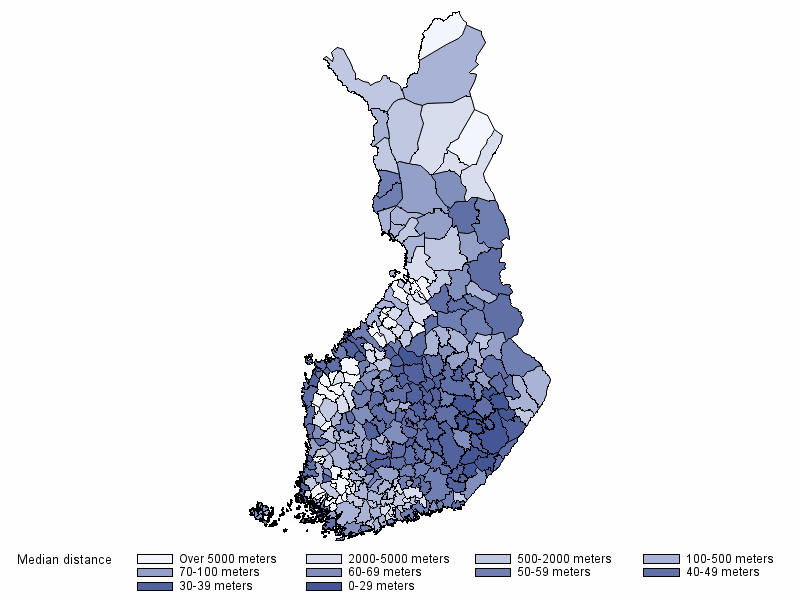Published: 28 May 2015
Free–time residences built in the 1960s and 1970s are closest to water
According to Statistics Finland, there were 500,400 free-time residences in Finland at the end of 2014. One-half of free-time residences had less than 65 metres to the closest lake or sea. The location of free-time residences in relation to the closest water varies greatly. Free-time residences built in the 1960s and 1970s were closest to a lake or the sea, as their median distance to water was just 37 metres. One-half of new free-time residences, that is, those built in the 2010s, are at a distance of under 58 metres from the closest water, which is slightly closer than for free-time residences built in the 1980s to 2000s.
Median distance of free-time residences to the closest lake or sea (darker colours denote a shorter median distance)

Old free-time residences built before 1960 had the longest distance to a lake or the sea, the median distance being around 339 metres. This is partly explained by that the statistics on free-time residences also include so-called granny cottages (residential buildings used for free-time dwelling). The median distance of these granny cottages used as free-time dwellings is around one kilometre to a larger waterway. All in all, the number of dry land cottages, whose distance to the closest lake or sea was at least half a kilometre, was around 149,000 in Finland.
Free-time residences in Lapland have the longest median distance to water, 477 metres. In North Ostrobothnia, the median distance of free-time residences to the closest lake or sea is also more than 400 metres. The shortest median distances to water are found in South Karelia and Etelä-Savo, around 30 metres. The biggest dispersion in the distance to water was recorded in Varsinais-Suomi, South Ostrobothnia and Lapland. In Åland, free-time residences are built evenly close to water and there the average distance to the nearest water is also shortest. Of municipalities, Taipalsaari and Luoto had the shortest median distance to a lake or the sea.
Mikkeli was still the municipality with the highest number of free-time residences in 2014
The order of municipalities with the highest number of free-time residences remained nearly unchanged in 2014. Measured by the number of free-time residences, Mikkeli had the highest number of free-time residences, followed by Kuopio and Parainen. Mikkeli was the only municipality that had more than 10,000 free-time residences. As a result of municipal mergers, the number of free-time residences in many towns describes the number of free-time residences in the area rather than the number of free-time residences in the actual town.
Highest number of free-time residences, 31 December 2014
| Regional Division based on Municipalities on 1 Jan. 2015 | ||
| 1. | Mikkeli | 10 324 |
| 2. | Kuopio | 9 602 |
| 3. | Parainen | 8 570 |
| 4. | Lohja | 8 408 |
| 5. | Savonlinna | 8 280 |
| 6. | Hämeenlinna | 7 861 |
| 7. | Kouvola | 7 732 |
| 8. | Salo | 7 238 |
| 9. | Kuusamo | 6 614 |
| 10. | Raasepori | 6 495 |
| 11. | Pori | 5 141 |
| 12. | Mäntyharju | 4 803 |
| 13. | Kemiönsaari | 4 706 |
| 14. | Kangasala | 4 604 |
| 15. | Naantali | 4 589 |
Source: Buildings and Free-time Residences, Statistics Finland
Inquiries: Topias Pyykkönen 029 551 2628, Marja Hermiö 029 551 3211, Arja Tiihonen 029 551 3272, asuminen@stat.fi
Director in charge: Harala Riitta
Publication in pdf-format (308.0 kB)
- Reviews
-
- Free-time Residences 2014 (28.5.2015)
- Building stock 2014 (28.5.2015)
- Tables
-
Tables in databases
Pick the data you need into tables, view the data as graphs, or download the data for your use.
Appendix tables
- Appendix table 1. Number of buildings, dwellings and persons by type of building and number of storeys 31 Dec. 2014 (28.5.2015)
- Appendix table 2. Number of buildings by intended use in 1980 - 2014 (28.5.2015)
- Appendix table 3. Number of buildings by heating fuel 1970-2014 (28.5.2015)
- Appendix table 4. Number of buildings by construction material 1960-2014 (28.5.2015)
Updated 26.5.2015
Official Statistics of Finland (OSF):
Buildings and free-time residences [e-publication].
ISSN=1798-6796. 2014. Helsinki: Statistics Finland [referred: 28.2.2026].
Access method: http://stat.fi/til/rakke/2014/rakke_2014_2015-05-28_tie_001_en.html

